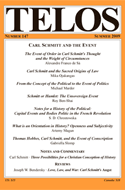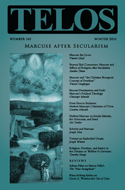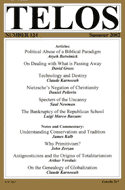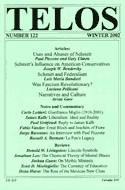By Beau Mullen · Friday, March 7, 2014 As an occasional feature on TELOSscope, we highlight a past Telos article whose critical insights continue to illuminate our thinking and challenge our assumptions. Today, Beau Mullen looks at Gabriella Slomp’s “Thomas Hobbes, Carl Schmitt, and the Event of Conscription” from Telos 147 (Summer 2009).
 As Gabriella Slomp points out in the opening of her article “Thomas Hobbes, Carl Schmitt, and the Event of Conscription,” scholars are split on how to view the relationship between Hobbes and Schmitt. Some see Schmitt as Hobbes’s heir apparent, while others think that Schmitt’s thinking is in fact a rejection of much of Hobbes’s work. Both thinkers emphasize man’s warlike nature, they hold that the state exists to protect men from violent death at the hands of other men, and they maintain that a strong state with unlimited power is best suited to this aim. Both agree that man has an obligation to the state that is reciprocal to the duty of the state to provide security. In this piece, Slomp examines both Schmitt’s and Hobbes’s views of the extent of this obligation and comes to the conclusion that the two are in fact in disagreement. Using their writings on conscription, Slomp reveals that Hobbes has much more concern for the sovereignty of the individual whereas Schmitt never wavers in his affording primacy to the group or state. As Gabriella Slomp points out in the opening of her article “Thomas Hobbes, Carl Schmitt, and the Event of Conscription,” scholars are split on how to view the relationship between Hobbes and Schmitt. Some see Schmitt as Hobbes’s heir apparent, while others think that Schmitt’s thinking is in fact a rejection of much of Hobbes’s work. Both thinkers emphasize man’s warlike nature, they hold that the state exists to protect men from violent death at the hands of other men, and they maintain that a strong state with unlimited power is best suited to this aim. Both agree that man has an obligation to the state that is reciprocal to the duty of the state to provide security. In this piece, Slomp examines both Schmitt’s and Hobbes’s views of the extent of this obligation and comes to the conclusion that the two are in fact in disagreement. Using their writings on conscription, Slomp reveals that Hobbes has much more concern for the sovereignty of the individual whereas Schmitt never wavers in his affording primacy to the group or state.
Continue reading →
By Joseph Diaz · Tuesday, January 21, 2014 Joseph Diaz’s “Schmitt and Marcuse: Friends, Force, and Quality” appears in Telos 165 (Winter 2013). Read the full version online at the Telos Online website, or purchase a print copy of the issue in our store.
 This article aims at exploring the potential for a politically operative theory of opposition to liberalism’s stultifying politics of process. Given their formal political positionality as critics of liberal neutrality, as well as their historically particular relationship to some of the most volatile politics of the twentieth century, Marcuse and Schmitt cannot but be brought into discourse with one another in the most pressing of times, for three reasons. First, by exploring the modalities of their respective criticisms, this article locates an enemy common to both thinkers in the neutralization of the political through the attempted elimination of the decision. Second, in using Schmitt’s framework of the friend-enemy distinction, further investigation into the potential complicities between anti-liberal thought illuminates the limitations of founding political friendship on mere enemy identification alone. This article aims at exploring the potential for a politically operative theory of opposition to liberalism’s stultifying politics of process. Given their formal political positionality as critics of liberal neutrality, as well as their historically particular relationship to some of the most volatile politics of the twentieth century, Marcuse and Schmitt cannot but be brought into discourse with one another in the most pressing of times, for three reasons. First, by exploring the modalities of their respective criticisms, this article locates an enemy common to both thinkers in the neutralization of the political through the attempted elimination of the decision. Second, in using Schmitt’s framework of the friend-enemy distinction, further investigation into the potential complicities between anti-liberal thought illuminates the limitations of founding political friendship on mere enemy identification alone.
Continue reading →
By Vincent Geoghegan · Monday, January 13, 2014 Vincent Geoghegan’s “Marcuse and ‘the Christian Bourgeois Concept of Freedom'” appears in Telos 165 (Winter 2013). Read the full version online at the Telos Online website, or purchase a print copy of the issue in our store.
 Current talk of the post-secular necessarily invites analysis of the nature of the secular, particularly its historical genesis and subsequent development. The task is to reject what Charles Taylor in A Secular Age has termed “subtraction stories” of the emergence of secularism, involving simplistic assumptions about the inexorable evaporation and attenuation of the religious, and instead understand the complex constitutive role religion has played in the construction of the secular. Marcuse’s work is of interest in this respect because beginning with his 1930s analysis of what he terms “the Christian bourgeois concept of freedom” within the Protestant Reformation, he explores the ways in which he believes modern secular society emerged out of Christianity. Current talk of the post-secular necessarily invites analysis of the nature of the secular, particularly its historical genesis and subsequent development. The task is to reject what Charles Taylor in A Secular Age has termed “subtraction stories” of the emergence of secularism, involving simplistic assumptions about the inexorable evaporation and attenuation of the religious, and instead understand the complex constitutive role religion has played in the construction of the secular. Marcuse’s work is of interest in this respect because beginning with his 1930s analysis of what he terms “the Christian bourgeois concept of freedom” within the Protestant Reformation, he explores the ways in which he believes modern secular society emerged out of Christianity.
Continue reading →
By Michael Millerman · Tuesday, July 16, 2013 As an occasional feature on TELOSscope, we highlight a past Telos article whose critical insights continue to illuminate our thinking and challenge our assumptions. Today, Michael Millerman looks at Luigi Marco Bassani’s “The Bankruptcy of the Republican School,” from Telos 124 (Summer 2002).
 Luigi Marco Bassani’s essay “The Bankruptcy of the Republican School” (2002) consists of an overview of the conflict in American historiography between two schools of thought. The first—Lockean liberalism—insists that America was founded on principles that recognize an abstract, natural right to life, liberty, property, and the pursuit of one’s private happiness. These natural rights are liberties that define a private sphere, to be protected from government interference. By contrast, the second school proclaims that not Lockean liberalism, but rather republicanism informed the Founders’ vision of what America is and should be. Republicanism elevates such notions as “the common good” and “the public sphere” above those of “individual liberties” and “private happiness.” Indeed, it can justify infringing on the latter for the sake of the former. Hence, it is in conflict with Lockean liberalism. Luigi Marco Bassani’s essay “The Bankruptcy of the Republican School” (2002) consists of an overview of the conflict in American historiography between two schools of thought. The first—Lockean liberalism—insists that America was founded on principles that recognize an abstract, natural right to life, liberty, property, and the pursuit of one’s private happiness. These natural rights are liberties that define a private sphere, to be protected from government interference. By contrast, the second school proclaims that not Lockean liberalism, but rather republicanism informed the Founders’ vision of what America is and should be. Republicanism elevates such notions as “the common good” and “the public sphere” above those of “individual liberties” and “private happiness.” Indeed, it can justify infringing on the latter for the sake of the former. Hence, it is in conflict with Lockean liberalism.
Continue reading →
By Jeffrey W. Robbins · Friday, April 5, 2013 The following paper was presented at the Seventh Annual Telos Conference, held on February 15–17, 2013, in New York City.
 With the confirmation hearings of John Brennan as director of the CIA fresh in the news, who can doubt the accuracy, or at least the resonance, of Carl Schmitt’s conception of the sovereign—the sovereign is “he who decides on the exception.” With sovereignty so conceived, it has effectively been cast outside the law, introducing a certain arbitrariness and creating a legal limbo that undermine the principles of a liberal democracy. With the confirmation hearings of John Brennan as director of the CIA fresh in the news, who can doubt the accuracy, or at least the resonance, of Carl Schmitt’s conception of the sovereign—the sovereign is “he who decides on the exception.” With sovereignty so conceived, it has effectively been cast outside the law, introducing a certain arbitrariness and creating a legal limbo that undermine the principles of a liberal democracy.
Enhanced interrogation. Drone attacks on foreign soil. Targeted assassinations. And now, a 16-page white paper from the Department of Justice outlining the legal authority to kill a U.S. citizen without trial. In the words of the New York Times report, the legal brief “adopts an elastic definition of an ‘imminent’ threat, saying it is not necessary for a specific attack to be in process when a target is found.” It also asserts that the decision to kill is not subject to judicial review or restraint.
Continue reading →
By Maja Sidzinska · Tuesday, February 26, 2013 As an occasional feature on TELOSscope, we highlight a past Telos article whose critical insights continue to illuminate our thinking and challenge our assumptions. Today, Maja Sidzinska looks at James Kalb’s “Liberalism: Ideal and Reality,” from Telos 122 (Winter 2002).
 James Kalb bluntly asks us: “Why does liberalism—the tradition that makes equal freedom the political touchstone—combine such strength with such incoherence? . . . Liberalism is triumphant almost everywhere, but its victory reverses the meaning of its principles. It calls for live-and-let-live, and enforces it by supervising everything” (111). Kalb explores the inherent tension between what he regards as the two core principles of liberalism—freedom and equality. Here, freedom is interpreted as the potential or ability to carry out one’s will, while equality is understood as the principle that ensures the right of each individual to do so. But what happens when two individuals’ wills are in conflict? Logically, liberalism has few intrinsic means to resolve such a scenario, argues Kalb. It simply “resolves disputes by letting each do as he likes consistent with the equal freedom of others, and in case of conflict the more tolerant wins” (117). In this case, “more tolerant” appears to refer to that stance which is less intrusive on the will, person, or property of another. James Kalb bluntly asks us: “Why does liberalism—the tradition that makes equal freedom the political touchstone—combine such strength with such incoherence? . . . Liberalism is triumphant almost everywhere, but its victory reverses the meaning of its principles. It calls for live-and-let-live, and enforces it by supervising everything” (111). Kalb explores the inherent tension between what he regards as the two core principles of liberalism—freedom and equality. Here, freedom is interpreted as the potential or ability to carry out one’s will, while equality is understood as the principle that ensures the right of each individual to do so. But what happens when two individuals’ wills are in conflict? Logically, liberalism has few intrinsic means to resolve such a scenario, argues Kalb. It simply “resolves disputes by letting each do as he likes consistent with the equal freedom of others, and in case of conflict the more tolerant wins” (117). In this case, “more tolerant” appears to refer to that stance which is less intrusive on the will, person, or property of another.
Continue reading →
|
|
 As Gabriella Slomp points out in the opening of her article “Thomas Hobbes, Carl Schmitt, and the Event of Conscription,” scholars are split on how to view the relationship between Hobbes and Schmitt. Some see Schmitt as Hobbes’s heir apparent, while others think that Schmitt’s thinking is in fact a rejection of much of Hobbes’s work. Both thinkers emphasize man’s warlike nature, they hold that the state exists to protect men from violent death at the hands of other men, and they maintain that a strong state with unlimited power is best suited to this aim. Both agree that man has an obligation to the state that is reciprocal to the duty of the state to provide security. In this piece, Slomp examines both Schmitt’s and Hobbes’s views of the extent of this obligation and comes to the conclusion that the two are in fact in disagreement. Using their writings on conscription, Slomp reveals that Hobbes has much more concern for the sovereignty of the individual whereas Schmitt never wavers in his affording primacy to the group or state.
As Gabriella Slomp points out in the opening of her article “Thomas Hobbes, Carl Schmitt, and the Event of Conscription,” scholars are split on how to view the relationship between Hobbes and Schmitt. Some see Schmitt as Hobbes’s heir apparent, while others think that Schmitt’s thinking is in fact a rejection of much of Hobbes’s work. Both thinkers emphasize man’s warlike nature, they hold that the state exists to protect men from violent death at the hands of other men, and they maintain that a strong state with unlimited power is best suited to this aim. Both agree that man has an obligation to the state that is reciprocal to the duty of the state to provide security. In this piece, Slomp examines both Schmitt’s and Hobbes’s views of the extent of this obligation and comes to the conclusion that the two are in fact in disagreement. Using their writings on conscription, Slomp reveals that Hobbes has much more concern for the sovereignty of the individual whereas Schmitt never wavers in his affording primacy to the group or state.  This article aims at exploring the potential for a politically operative theory of opposition to liberalism’s stultifying politics of process. Given their formal political positionality as critics of liberal neutrality, as well as their historically particular relationship to some of the most volatile politics of the twentieth century, Marcuse and Schmitt cannot but be brought into discourse with one another in the most pressing of times, for three reasons. First, by exploring the modalities of their respective criticisms, this article locates an enemy common to both thinkers in the neutralization of the political through the attempted elimination of the decision. Second, in using Schmitt’s framework of the friend-enemy distinction, further investigation into the potential complicities between anti-liberal thought illuminates the limitations of founding political friendship on mere enemy identification alone.
This article aims at exploring the potential for a politically operative theory of opposition to liberalism’s stultifying politics of process. Given their formal political positionality as critics of liberal neutrality, as well as their historically particular relationship to some of the most volatile politics of the twentieth century, Marcuse and Schmitt cannot but be brought into discourse with one another in the most pressing of times, for three reasons. First, by exploring the modalities of their respective criticisms, this article locates an enemy common to both thinkers in the neutralization of the political through the attempted elimination of the decision. Second, in using Schmitt’s framework of the friend-enemy distinction, further investigation into the potential complicities between anti-liberal thought illuminates the limitations of founding political friendship on mere enemy identification alone. Luigi Marco Bassani’s essay “The Bankruptcy of the Republican School” (2002) consists of an overview of the conflict in American historiography between two schools of thought. The first—Lockean liberalism—insists that America was founded on principles that recognize an abstract, natural right to life, liberty, property, and the pursuit of one’s private happiness. These natural rights are liberties that define a private sphere, to be protected from government interference. By contrast, the second school proclaims that not Lockean liberalism, but rather republicanism informed the Founders’ vision of what America is and should be. Republicanism elevates such notions as “the common good” and “the public sphere” above those of “individual liberties” and “private happiness.” Indeed, it can justify infringing on the latter for the sake of the former. Hence, it is in conflict with Lockean liberalism.
Luigi Marco Bassani’s essay “The Bankruptcy of the Republican School” (2002) consists of an overview of the conflict in American historiography between two schools of thought. The first—Lockean liberalism—insists that America was founded on principles that recognize an abstract, natural right to life, liberty, property, and the pursuit of one’s private happiness. These natural rights are liberties that define a private sphere, to be protected from government interference. By contrast, the second school proclaims that not Lockean liberalism, but rather republicanism informed the Founders’ vision of what America is and should be. Republicanism elevates such notions as “the common good” and “the public sphere” above those of “individual liberties” and “private happiness.” Indeed, it can justify infringing on the latter for the sake of the former. Hence, it is in conflict with Lockean liberalism.  With the confirmation hearings of John Brennan as director of the CIA fresh in the news, who can doubt the accuracy, or at least the resonance, of Carl Schmitt’s conception of the sovereign—the sovereign is “he who decides on the exception.” With sovereignty so conceived, it has effectively been cast outside the law, introducing a certain arbitrariness and creating a legal limbo that undermine the principles of a liberal democracy.
With the confirmation hearings of John Brennan as director of the CIA fresh in the news, who can doubt the accuracy, or at least the resonance, of Carl Schmitt’s conception of the sovereign—the sovereign is “he who decides on the exception.” With sovereignty so conceived, it has effectively been cast outside the law, introducing a certain arbitrariness and creating a legal limbo that undermine the principles of a liberal democracy.  James Kalb bluntly asks us: “Why does liberalism—the tradition that makes equal freedom the political touchstone—combine such strength with such incoherence? . . . Liberalism is triumphant almost everywhere, but its victory reverses the meaning of its principles. It calls for live-and-let-live, and enforces it by supervising everything” (111). Kalb explores the inherent tension between what he regards as the two core principles of liberalism—freedom and equality. Here, freedom is interpreted as the potential or ability to carry out one’s will, while equality is understood as the principle that ensures the right of each individual to do so. But what happens when two individuals’ wills are in conflict? Logically, liberalism has few intrinsic means to resolve such a scenario, argues Kalb. It simply “resolves disputes by letting each do as he likes consistent with the equal freedom of others, and in case of conflict the more tolerant wins” (117). In this case, “more tolerant” appears to refer to that stance which is less intrusive on the will, person, or property of another.
James Kalb bluntly asks us: “Why does liberalism—the tradition that makes equal freedom the political touchstone—combine such strength with such incoherence? . . . Liberalism is triumphant almost everywhere, but its victory reverses the meaning of its principles. It calls for live-and-let-live, and enforces it by supervising everything” (111). Kalb explores the inherent tension between what he regards as the two core principles of liberalism—freedom and equality. Here, freedom is interpreted as the potential or ability to carry out one’s will, while equality is understood as the principle that ensures the right of each individual to do so. But what happens when two individuals’ wills are in conflict? Logically, liberalism has few intrinsic means to resolve such a scenario, argues Kalb. It simply “resolves disputes by letting each do as he likes consistent with the equal freedom of others, and in case of conflict the more tolerant wins” (117). In this case, “more tolerant” appears to refer to that stance which is less intrusive on the will, person, or property of another. 

